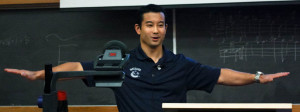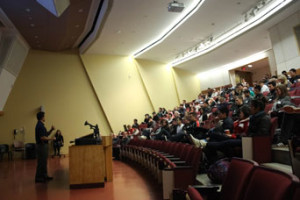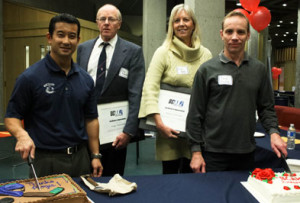Back in November, Roger Takahashi, strength and conditioning coach of the Vancouver Canucks, gave a talk on his experiences following his graduation with a degree in kinesiology. If you missed out, or you just want to refer back to some of the things he discussed, Elizabeth Moffat wrote an article for SFU OLC detailing the event and was kind enough to allow us to repost it below. Enjoy.

On November 15th BPK Co-op and the Biomedical Physiology & Kinesiology Student Association (BPKSA) hosted an event celebrating the British Columbia Association of Kinesiologists (BCAK) 20th Anniversary, and featuring a talk from Roger Takahashi, strength & conditioning coach of the Vancouver Canucks.
The OLC also Storifed the event where Craig Asmundson and Nancy Johnston, founding BCAK members, were presented with lifetime honours. Following a brief talk on the history of BCAK Roger Takahashi took the stage.
Roger began by reflecting on the fact that not long ago kinesiology was regarded as a mystery by the general public, few outside of the field took the practise seriously, but this has clearly changed in recent years. BPK grads no longer have to justify their degree choice at every turn, and Roger hopes that as programs grow students will continue to champion the practice.
Roger earned a Bachelor of Science in General Science from the University of Waterloo before returning to complete a Bachelor of Science (Honours) in Kinesiology. He is also a Certified Strength and Conditioning Specialist (CSCS) through the National Strength and Conditioning Association, and a member of BCAK. Roger also recommends students take some psychology courses if they strive to work with athletes.
Before joining the Vancouver Canucks, Roger trained various athletes through his own company as well as working as the strength and conditioning coach for the BCHL’s Langley Hornets. Although he was with the team to train the players, as with many minor league teams he ended up doing a little of everything, from darning socks to mopping up locker rooms.
While working in the minors wasn’t exactly a glamorous gig, it allowed Roger to work at something he loved. He believes that this passion is important, saying that if you work hard and “do what you love, the money will eventually follow.”
Roger also played hockey until he was fourteen, but admits that he was simply too small and not good enough to continue playing at the level he would have liked. Little did he know, this hands-on hockey experience would one day help him land his dream job.
Roger heard that the Canucks were looking for strength and conditioning coach through his job with the Hornets, a few months after submitting his resume he was called in for a group interview. To his surprise the interview focused as much on day-to-day hockey knowledge as it did on his kinesiology background. Having spent years playing, working with, and watching hockey Roger had gained an advantage in the interview, and landed the job.

Now his job consists of early mornings and numerous road trips. He travels with the team, arrives at the arena before every practice, works with injured players on off-days, and occasionally sleeps over at the arena.
Still, he knows that he has it easier than his predecessors. Players take their overall health more seriously now, staying in shape year-round rather than spending their summer on less productive activities.
A lot of students had questions about Roger’s day-to-day training regime, but he couldn’t provide a simple answer. He told us about his first year on the team, when he tried to plan every day weeks in advance. He soon found out, however, that it was impossible. There are simply too many unexpected changes, some players may need more attention than others, and the head coach can suddenly decide the team needs an off day, or that some players need on-ice practice while others should hit the gym. Now he sets out broad general plan for the season.
Roger also revealed that most of his time isn’t spent how most students expected, doing hours of one-on-one training with players. Instead, he spends most of his time following up on injuries and doing a lot of research (that’s right, the hours you spend studying won’t end when you graduate.) He needs to research constantly, staying on top of the latest in changes to hockey gear (stronger sticks and rigid skates make a bigger physical difference than you might expect,) and making sure players that players are taking the right supplements – and that they’re legal. Working for a West coast team adds another layer of difficulty, as travel takes a toll on the team, and he often needs to help newly acquired East coast players adapt.
Many in the room were also surprised to learn that a win or a loss does not necessarily equal a change to the next days workouts. Unless the coaches see a need to work on something specific Roger tries to keep work outs consistent.

When asked about how much input he has on choosing draft picks, Roger downplayed his role while offering some good advice for any student. He said that he tries not to put too much stake in the annual physical tests prospects and draftees go through. After all, these tests only represent “one hour of one day of his life.” There can be a million factors that contribute to the end result. Did they just fly in? How long was their last season and did they have to recover from injuries? What else was happening that hampered their ability to train?
These are all valid points that can translate to any number of situations in life. So if I took one thing away from this event, it won’t be the fun behind the scenes hockey info. It will be the reminder that when it comes down to it, any big interview, test, or presentation is really only one hour of one day of the rest of my life.
Originally written by Elizabeth Moffat for SFU OLC.











